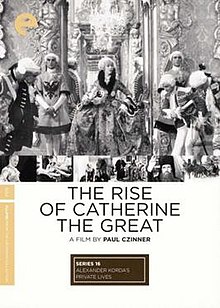Ekaterina the Rise of Catherine the Great Review
| The Rising of Catherine the Smashing | |
|---|---|
 | |
| Directed by | Paul Czinner |
| Written by | Marjorie Deans Arthur Wimperis |
| Produced by | Alexander Korda Ludovico Toeplitz (uncredited) |
| Starring | Elisabeth Bergner Douglas Fairbanks Jr. Flora Robson |
| Narrated by | Alexander Kerensky |
| Cinematography | Georges Périnal |
| Edited by | Stephen Harrison Harold Young |
| Music past | Ernst Toch (uncredited) Irving Berlin |
| Product | London Films |
| Distributed by | United Artists |
| Release date |
|
| Running time | 94 minutes |
| Country | United Kingdom |
| Language | English language |
The Ascent of Catherine the Peachy (likewise titled Catherine the Great ) is a 1934 British historical picture show based on the play The Czarina by Lajos Bíró and Melchior Lengyel, about the rise to power of Catherine the Great. Information technology was directed by Paul Czinner, and stars Elisabeth Bergner equally Catherine, Douglas Fairbanks, Jr., as Grand Duke Peter, Dorothy Hale as Countess Olga, and Flora Robson as Empress Elizabeth.
The movie was banned in Germany. On fourteen March 1934 this affair invoked a question in the British Parliament (Firm of Commons): "Is it to exist understood that no British picture show in which there is a Jewish actor or extra will be permitted to be shown in Frg in futurity?".[i]
Plot [edit]
This historical drama recounts the events that led to the accretion of Catherine the Peachy, Empress of all the Russias. The film opens with the inflow in 1744 of Princess Sophie Auguste Frederika – whose proper name would be changed to 'Catherine' – from her father's court of Anhalt-Zerbst (in modern Germany) to the court of the Empress Elizabeth. "Piffling Catherine" is to marry the Grand Duke Peter, nephew and heir presumptive of the unmarried and childless Empress Elizabeth.
Peter already displays signs of mental instability and a sharply misogynist streak. He rejects Catherine on their wedding ceremony night, reacting to something innocently said by his French valet, claiming that she used feminine tricks to win him over. In time, though, Peter accepts her and they have a happy wedlock for a while. Meanwhile, Catherine gains important experience of government from working equally master aide to the empress.
The empress dies and Peter becomes tsar, but his mental illness is starting to get the better of him, along with sheer boredom in the job. Catherine still loves him despite beginning a very public love matter with one of her best friends – until one dark when Peter goes i step besides far in publicly humiliating his wife. She ceases to love him, which enables her to be clear-headed in supporting a planned putsch. The following morning time, he is arrested and Catherine is made Empress of All the Russias.
The elevation is marred by Peter's murder that very forenoon, opposite to Catherine'southward control. Grigory Orlov explains that everything has a price, and the crown has the highest price of all. The picture show ends, with Catherine in tears on her throne, while the thanks of the crowds are heard outside.
Reception [edit]
Variety 's original 1933 review summed up the film as having numerous sequences with outstanding "management, portrayal and dialog," particularly crediting performances by Fairbanks (whose operation they described as one of the best of his career) and Robson, while noting that Bergner was "altogether conceivable" as the young Catherine.[2]
New York Times reviewer Dave Kehr described the film as "a handsome only conventional melodrama," but inferior to the contemporaneous rival Catherine biopic The Scarlet Empress (1934) by Josef von Sternberg.[three]
The Guardian's historical films reviewer Alex von Tunzelmann credits the film with both entertainment value (form: B-) and substantial historical depth and accuracy (grade: B-).[four]
Cast [edit]
- Douglas Fairbanks, Jr., as G Knuckles Peter
- Elisabeth Bergner as Catherine
- Flora Robson every bit Empress Elisabeth
- Gerald du Maurier as Lecocq
- Irene Vanbrugh as Princess Anhalt-Zerbst
- Joan Gardner as Katushienka
- Dorothy Hale as Countess Olga
- Diana Napier as Countess Vorontzova
- Griffith Jones as Grigory Orlov
- Gibb McLaughlin as Bestujhev (as Gibb MacLaughlin)
- Clifford Heatherley as Ogarev
- Laurence Hanray as Goudovitch
- Allan Jeayes as Col. Karnilov
References [edit]
- ^ retrieved Apr 26, 2020
- ^ "The Ascension of Catherine the Great", December 31, 1933, Variety retrieved February 20, 2020
- ^ Dave Kehr, "Alexander Korda'due south Historical Films Hold a Fun Business firm Mirror Upward to the Nowadays," May 6, 2009, New York Times, retrieved Feb 20, 2020
- ^ von Tunzelmann, Alex "The Ascent of Catherine the Cracking: not too much horseplay; Flora Robson and Douglas Fairbanks, Jr. help make this broadly accurate biopic of the Russian empress wickedly enjoyable," July 24, 2014, The Guardian, retrieved February 20, 2020
External links [edit]
- The Rise of Catherine the Swell at IMDb
- The Rise of Catherine the Great at the TCM Movie Database
- The Rise of Catherine the Great at AllMovie
- The Rise of Catherine the Corking view picture online at YouTube.com
- The Rise of Catherine the Cracking is available for free download at the Internet Archive
Source: https://en.wikipedia.org/wiki/The_Rise_of_Catherine_the_Great
0 Response to "Ekaterina the Rise of Catherine the Great Review"
Post a Comment